-
Countries
-
Data and Analysis
-
Special Focus
-
Crisis Responses
Chad — Emergency Tracking Tool Report
Country
Title Standard
Chad — Emergency Tracking Tool Report # (DATE)
Operation
Contact
DTM Chad, dtmtchad@iom.int
Component
Domain
Confidential

Contact
DTM Chad, dtmtchad@iom.int
Language
English
Location
Chad
Period Covered
Aug 22 2024
Aug 22 2024
Activity
- Mobility Tracking
- Event Tracking
Environ 910 000 personnes sont estimées avoir traversé la frontière vers le Tchad depuis le début de la crise au Soudan, incluant 213 339 parmi eux qui sont des retournés tchadiens depuis fin juillet. L’OIM s’attend à ce que ce nombre passe à 240 000 d’ici fin décembre 2024, en raison de la reprise du conflit au Darfour.

Contact
DTM Chad, dtmtchad@iom.int
Language
English
Location
Chad
Period Covered
Jul 01 2024
Jul 29 2024
Activity
- Mobility Tracking
- Event Tracking
The purpose of the emergency tracking tool is to collect information on sudden and significant displacements mainly triggered by security and natural disasters. The information is collected through key informant interviews and direct observations. This dashboard presents an overview of confirmed population movements from July 1 to July 29, 2024 in the Lake province

Contact
DTM Chad, dtmtchad@iom.int
Language
English
Location
Chad
Period Covered
Aug 06 2024
Aug 06 2024
Activity
- Mobility Tracking
- Event Tracking
Environ 910,000 personnes ont traversé la frontière vers le Tchad depuis le début de la crise au Soudan, incluant 201,379 parmi eux sont des retournés tchadiens. L'OIM s’attend à ce que ce nombre passe à 240,000 d’ici fin décembre 2024, en raison de la reprise du conflit au Darfour.

Contact
DTM Chad, dtmtchad@iom.int
Language
English
Location
Chad
Period Covered
Aug 06 2024
Aug 06 2024
Activity
- Mobility Tracking
- Event Tracking
An estimated 910,000 people have crossed into Chad since the onset of the crisis in Sudan, of which 201,379 among them are Chadian returnees. IOM expects this number to rise to 240,000 through to December 2024. This is due to ongoing conflict and food insecurity in Darfur, owing to the current suspension of the humanitarian corridor between Chad and Darfur.

Contact
DTM Chad, dtmtchad@iom.int
Language
English
Location
Chad
Period Covered
Jul 16 2024
Jul 16 2024
Activity
- Mobility Tracking
- Event Tracking
An estimated 823,000 people have crossed into Chad since the onset of the crisis in Sudan, of which 201,379 among them are Chadian returnees. IOM expects this number to rise to 240,000 through to December 2024. This is due to ongoing conflict and food insecurity in Darfur, owing to the current suspension of the humanitarian corridor between Chad and Darfur.
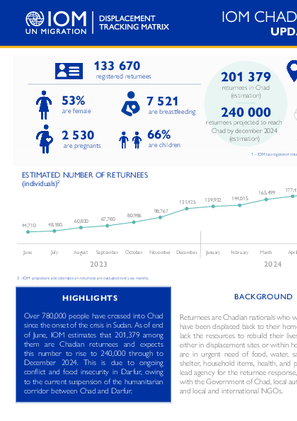
Contact
DTM Chad, dtmtchad@iom.int
Language
English
Location
Chad
Period Covered
Jul 09 2024
Jul 09 2024
Activity
- Mobility Tracking
- Event Tracking
Over 780,000 people have crossed into Chad since the onset of the crisis in Sudan. As of end June 2024, IOM estimates that 201,379 among them are Chadian returnees and expects this number to rise to 240,000 through to December 2024. This is due to ongoing conflict and food insecurity in Darfur, owing to the current suspension of the humanitarian corridor between Chad and Darfur.
Returnees are Chadian nationals who were living in Sudan and have been displaced back to their home country where they lack the resources to rebuild their lives. Returnees are living either in displacement sites or within host communities. They are in urgent need of food, water, sanitation and hygiene shelter, household items, health, and protection. IOM is the lead agency for the returnee response, in close coordination with the Government of Chad, local authorities, UN agencies, and local and international NGOs.
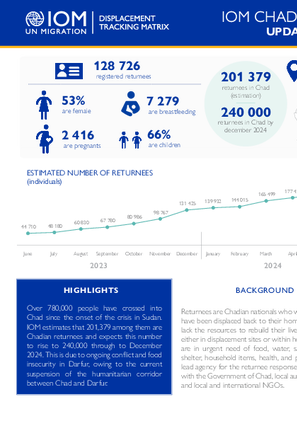
Contact
DTM Chad, dtmtchad@iom.int
Language
English
Location
Chad
Period Covered
Jun 18 2024
Jun 18 2024
Activity
- Mobility Tracking
- Event Tracking
Over 780,000 people have crossed into Chad since the onset of the crisis in Sudan. IOM estimates that 201,379 among them are Chadian returnees and expects this number to rise to 240,000 through to December 2024. This is due to ongoing conflict and food insecurity in Darfur, owing to the current suspension of the humanitarian corridor between Chad and Darfur.
Returnees are Chadian nationals who were living in Sudan and have been displaced back to their home country where they lack the resources to rebuild their lives. Returnees are living either in displacement sites or within host communities. They are in urgent need of food, water, sanitation and hygiene shelter, household items, health, and protection. IOM is the lead agency for the returnee response, in close coordination with the Government of Chad, local authorities, UN agencies, and local and international NGOs.
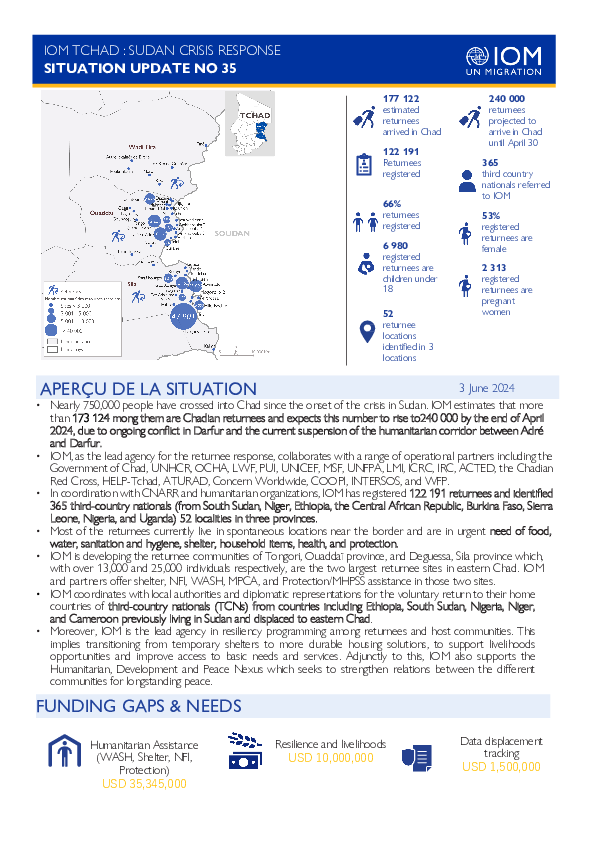
Contact
DTM Chad, dtmtchad@iom.int
Language
English
Location
Chad
Snapshot Date
Jun 03 2024
Activity
- Mobility Tracking
- Event Tracking
• Nearly 750,000 people have crossed into Chad since the onset of the crisis in Sudan. IOM estimates that more than 173 124 mong them are Chadian returnees and expects this number to rise to240 000 by the end of April 2024, due to ongoing conflict in Darfur and the current suspension of the humanitarian corridor between Adré and Darfur.
• IOM, as the lead agency for the returnee response, collaborates with a range of operational partners including the Government of Chad, UNHCR, OCHA, LWF, PUI, UNICEF, MSF, UNFPA, LMI, ICRC, IRC, ACTED, the Chadian Red Cross, HELP-Tchad, ATURAD, Concern Worldwide, COOPI, INTERSOS, and WFP.
• In coordination with CNARR and humanitarian organizations, IOM has registered 122 191 returnees and identified 365 third-country nationals (from South Sudan, Niger, Ethiopia, the Central African Republic, Burkina Faso, Sierra Leone, Nigeria, and Uganda) 52 localities in three provinces.
• Most of the returnees currently live in spontaneous locations near the border and are in urgent need of food, water, sanitation and hygiene, shelter, household items, health, and protection.
• IOM is developing the returnee communities of Tongori, Ouaddaï province, and Deguessa, Sila province which, with over 13,000 and 25,000 individuals respectively, are the two largest returnee sites in eastern Chad. IOM and partners offer shelter, NFI, WASH, MPCA, and Protection/MHPSS assistance in those two sites.
• IOM coordinates with local authorities and diplomatic representations for the voluntary return to their home countries of third-country nationals (TCNs) from countries including Ethiopia, South Sudan, Nigeria, Niger, and Cameroon previously living in Sudan and displaced to eastern Chad.
• Moreover, IOM is the lead agency in resiliency programming among returnees and host communities. This implies transitioning from temporary shelters to more durable housing solutions, to support livelihoods opportunities and improve access to basic needs and services. Adjunctly to this, IOM also supports the Humanitarian, Development and Peace Nexus which seeks to strengthen relations between the different communities for longstanding peace.
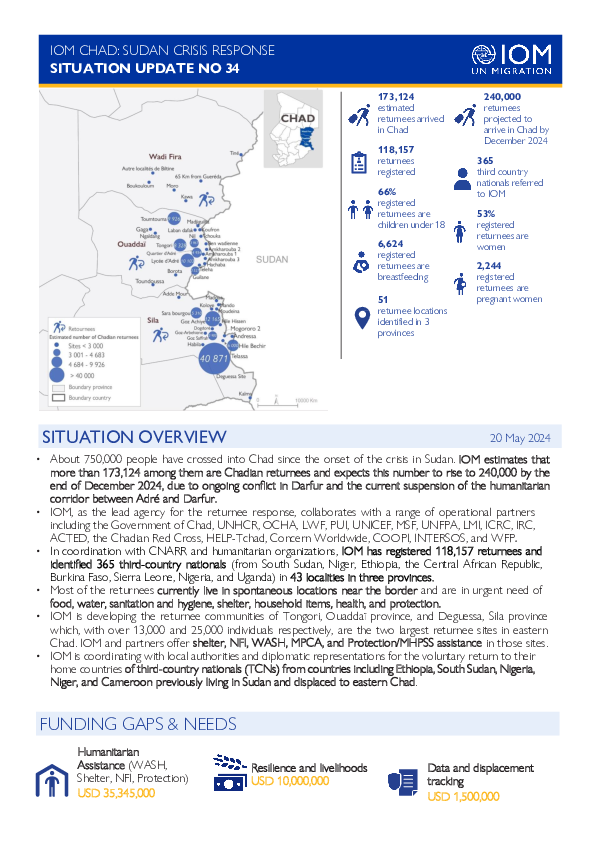
Contact
DTM Chad, dtmtchad@iom.int
Language
English
Location
Chad
Snapshot Date
May 20 2024
Activity
- Mobility Tracking
- Event Tracking
• About 750,000 people have crossed into Chad since the onset of the crisis in Sudan. IOM estimates that more than 173,124 among them are Chadian returnees and expects this number to rise to 240,000 by the end of December 2024, due to ongoing conflict in Darfur and the current suspension of the humanitarian corridor between Adré and Darfur.
• IOM, as the lead agency for the returnee response, collaborates with a range of operational partners including the Government of Chad, UNHCR, OCHA, LWF, PUI, UNICEF, MSF, UNFPA, LMI, ICRC, IRC, ACTED, the Chadian Red Cross, HELP-Tchad, Concern Worldwide, COOPI, INTERSOS, and WFP.
• In coordination with CNARR and humanitarian organizations, IOM has registered 118,157 returnees and identified 365 third-country nationals (from South Sudan, Niger, Ethiopia, the Central African Republic, Burkina Faso, Sierra Leone, Nigeria, and Uganda) in 43 localities in three provinces.
• Most of the returnees currently live in spontaneous locations near the border and are in urgent need of food, water, sanitation and hygiene, shelter, household items, health, and protection.
• IOM is developing the returnee communities of Tongori, Ouaddaï province, and Deguessa, Sila province which, with over 13,000 and 25,000 individuals respectively, are the two largest returnee sites in eastern Chad. IOM and partners offer shelter, NFI, WASH, MPCA, and Protection/MHPSS assistance in those sites.
• IOM is coordinating with local authorities and diplomatic representations for the voluntary return to their home countries of third-country nationals (TCNs) from countries including Ethiopia, South Sudan, Nigeria, Niger, and Cameroon previously living in Sudan and displaced to eastern Chad.
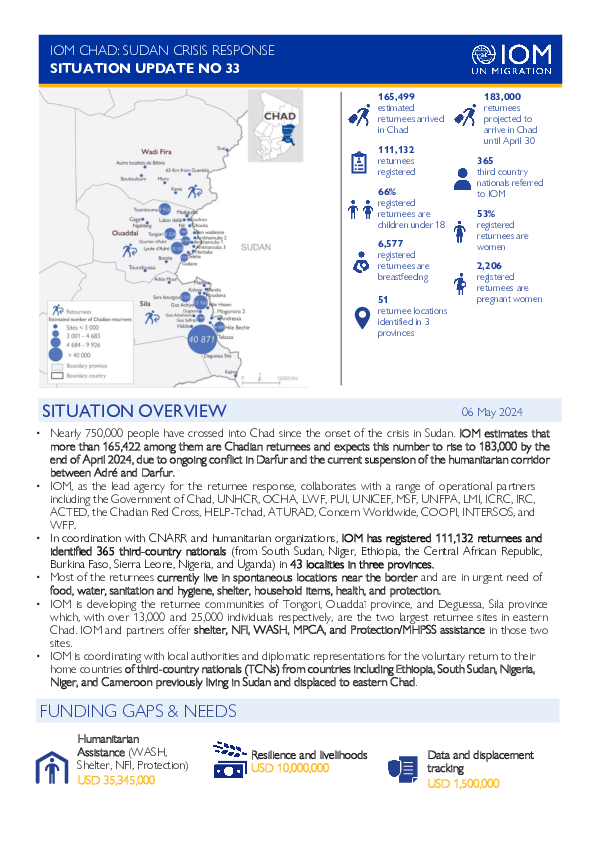
Contact
DTM Chad, dtmtchad@iom.int
Language
English
Location
Chad
Snapshot Date
May 06 2024
Activity
- Mobility Tracking
- Event Tracking
• Nearly 750,000 people have crossed into Chad since the onset of the crisis in Sudan. IOM estimates that more than 165,422 among them are Chadian returnees and expects this number to rise to 183,000 by the end of April 2024, due to ongoing conflict in Darfur and the current suspension of the humanitarian corridor between Adré and Darfur.
• IOM, as the lead agency for the returnee response, collaborates with a range of operational partners including the Government of Chad, UNHCR, OCHA, LWF, PUI, UNICEF, MSF, UNFPA, LMI, ICRC, IRC, ACTED, the Chadian Red Cross, HELP-Tchad, ATURAD, Concern Worldwide, COOPI, INTERSOS, and WFP.
• In coordination with CNARR and humanitarian organizations, IOM has registered 111,132 returnees and identified 365 third-country nationals (from South Sudan, Niger, Ethiopia, the Central African Republic, Burkina Faso, Sierra Leone, Nigeria, and Uganda) in 43 localities in three provinces.
• Most of the returnees currently live in spontaneous locations near the border and are in urgent need of food, water, sanitation and hygiene, shelter, household items, health, and protection.
• IOM is developing the returnee communities of Tongori, Ouaddaï province, and Deguessa, Sila province which, with over 13,000 and 25,000 individuals respectively, are the two largest returnee sites in eastern Chad. IOM and partners offer shelter, NFI, WASH, MPCA, and Protection/MHPSS assistance in those two sites.
• IOM is coordinating with local authorities and diplomatic representations for the voluntary return to their home countries of third-country nationals (TCNs) from countries including Ethiopia, South Sudan, Nigeria, Niger, and Cameroon previously living in Sudan and displaced to eastern Chad.
Pagination
- Previous page
- Page 2
- Next page
